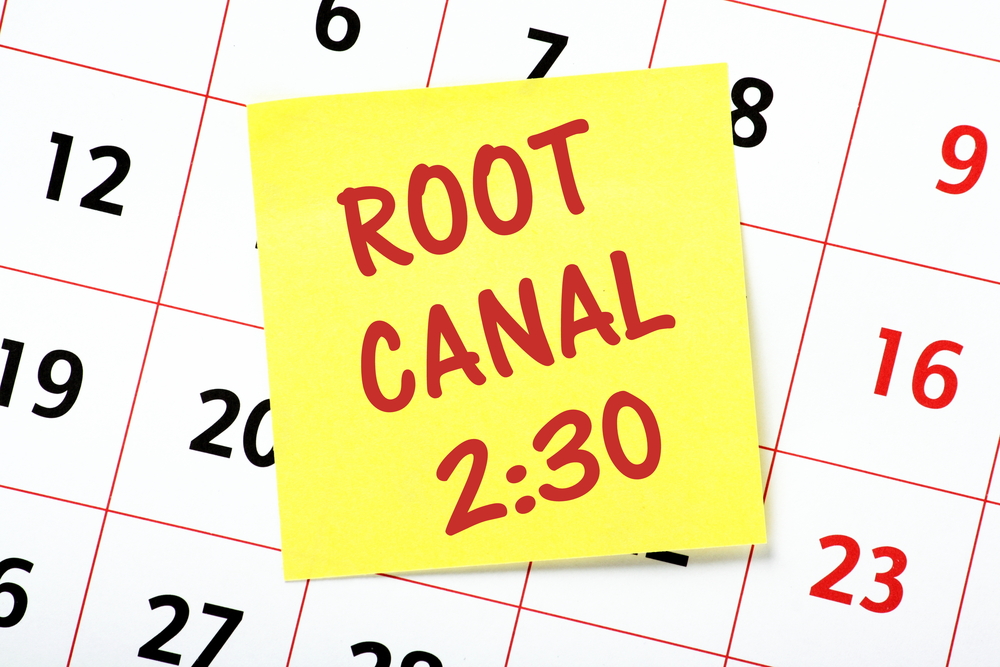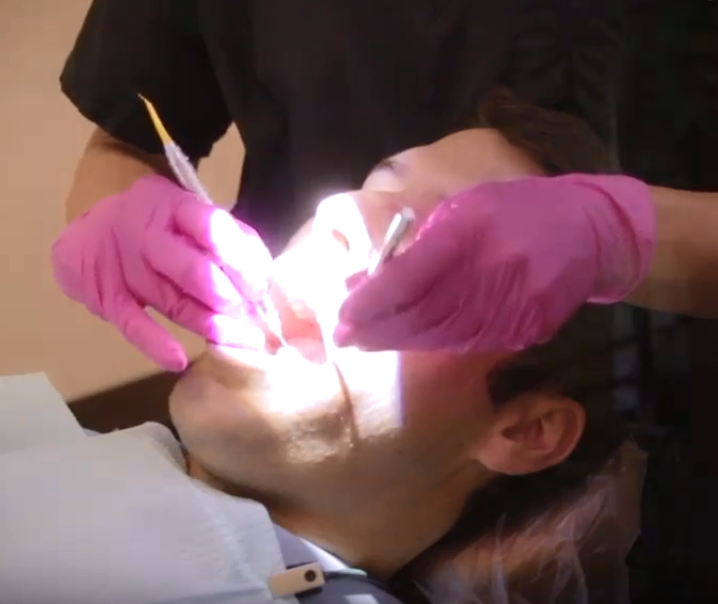
by Dr. Jacqueline S. Allen | Aug 23, 2020 | Blog, Endodontics, Endodontist, Root Canal
Root canal treatments are highly effective in saving injured or infected natural teeth. They are typically not lengthy procedures, but most laypeople are not clear on what’s involved in a root canal or what to look for when selecting a practitioner. If your regular dentist has recommended an endodontist perform your root canal, you will want to be fully informed and feel confident about your treatment. Here are some questions to help you prepare.

What To Ask Your Endodontist Before A Root Canal Treatment
-
What kind of equipment is used for root canals? Endodontists typically perform the procedure far more frequently than a general dentist, so they also have specialized equipment that make the process easier and faster. This equipment can also help better resolve unexpected challenges that may present themselves during the treatment.
-
Do I need to take antibiotics before my root canal treatment? If you have certain types of systemic health issues, including a past history of infective endocarditis, your endodontist may prescribe antibiotic prophylaxis to ensure that you are protected should any oral bacteria enter the bloodstream. If you have an abscess, antibiotics may also be called for. Discuss your entire health history with your endodontist when your root canal is in the planning stages.
-
How many visits will my root canal take? Most root canal treatments are done in a single session, but occasionally you will need to return for a second appointment to finish the procedure. If that’s the case, your endodontist will place a temporary filling to protect your tooth until the treatment is finished.
-
How soon should I make my root canal appointment? Your regular dentist may have already communicated some of your symptoms to the endodontist, and this may give them a rough idea of how soon you need to be treated. However, some symptoms of a serious tooth injury are only apparent after a thorough clinical examination by a specialist; even if you think your symptoms aren’t bothersome, you should make an endodontic appointment as soon as one is available.
-
What should I do if I experience pain after my root canal? Your endodontist should provide you with a pain management plan for the first few days after your treatment, when some discomfort is normal. This may include information on using cold packs or pain-reducing medication. If you experience moderate or severe pain after the third day following your procedure, call your endodontist to see if they would like you to come back in for a recheck.
“Endodontists welcome questions from patients before, during, and after a root canal treatment,” says Dr. Allen, who practices with the Phoenix Endodontic Group. “We want you to understand your case fully, and we will provide you all the information you need to be comfortable and confident about your procedure.”

by Dr. Jacqueline S. Allen | Jun 24, 2020 | Blog, Endodontics, Endodontist, Phoenix Endodontic Group, Root Canal
Root canals are often the treatment of choice when you develop a serious infection involving your natural tooth’s pulp, or if your tooth has been chipped, cracked, or otherwise damaged. However, while root canals have a high success rate and a high patient satisfaction rate, not every root canal ends up being a permanent solution.
The factors that initially bring a patient to the endodontist influence whether their tooth can be saved by a root canal. Here is a short list of conditions that can make saving a tooth with a root canal treatment more challenging.
 Factors That Can Interfere With Saving Natural Teeth With Root Canals
Factors That Can Interfere With Saving Natural Teeth With Root Canals
-
Teeth with long or unusually curved roots. Endodontists use special tools and seal the roots. If a patient’s canals are hard to clean, it may be less likely that the treatment will be permanently successful.
-
A crack in the tooth root. Even though teeth treated with a root canal are protected above the gum line with a restoration such as a crown, if the root itself develops a crack, infection can re-enter the tooth.
-
Advanced periodontal disease. Your gums play an integral role in your oral health and if you have severe or recurrent gum disease, saving your natural tooth through a root canal is far less likely to be successful.
-
Previous root canal treatment of the tooth. There are ways to treat a tooth if the original root canal fails, such as a retreatment or an apicoectomy. However, the success rates for additional procedures are not as high as for a first-time root canal treatment.
“Although root canal treatment often provides a lifelong solution for a damaged or infected natural tooth, it isn’t the best choice for every patient,” says Dr. Allen, an endodontist who practices with the Phoenix Endodontic Group. “Our staff can perform a thorough examination and advise you on your best treatment options.”

by Dr. Jacqueline S. Allen | Mar 31, 2020 | Blog, Endodontics, Endodontist, Root Canal
A damaged or infected tooth needs to be assessed by a dental professional as soon as possible. Endodontists are dental professionals who specialize in saving natural teeth through root canal treatments and other procedures. However, even with today’s technology, the most skilled of endodontists cannot save every tooth. There are times when the best course of action is simply to have a failing tooth removed.

Situations In Which A Root Canal Is Better
-
The symptoms of a damaged tooth are recognized early. If you notice severe pain while chewing, a pimple on your gum, tender gums, lasting sensitivity to hot or cold foods, or certain other symptoms that indicate your tooth’s pulp is infected, schedule an appointment with your dentist or endodontist immediately. The sooner your tooth can be examined, the more likely it is your natural tooth can be saved.
-
Your tooth’s structure is still strong. Root canals remove the nerve pulp inside your tooth’s roots and replace them with a biocompatible material. A crown is placed over the treated tooth to provide it with additional support. This treatment can be effective long-term 95 percent of the time, but if your tooth’s structure has been eroded by decay or injury, it is much less likely to be successful.
-
Your tooth roots are relatively easy to clean. The success of a root canal hinges largely on how well your endodontist can remove infection from your tooth roots before sealing the canals. If you have long or unusually shaped root canals, this may be difficult.
When Extraction Is Better
Your dental professional may recommend a tooth extraction if any of the following are true:
-
The tooth is badly decayed
-
The tooth has suffered a severe fracture
-
The tooth isn’t supported well by the surrounding gum tissue due to periodontal disease
-
The tooth has received a root canal treatment or retreatment and is still failing
“Your endodontist can determine whether an extraction and tooth replacement or a root canal is the better option for your natural tooth,” says Dr. Allen, who practices with the Phoenix Endodontic Group. “Both treatments are effective in restoring your mouth’s function and appearance.”

by Dr. Jacqueline S. Allen | Feb 10, 2020 | Blog, Endodontist, Phoenix Endodontic Group, Root Canal
Dr. Jacqueline Allen is qualified to utilize the minimally invasive Waterlase™ to treat dental conditions with less discomfort to the patient and in some cases use less to no anesthetic. Dr. Allen completed the advanced endodontics continuing education with Dr. William Chen, at the Chen Laser Institute. The course provided in depth training for laser-assisted endodontics to help meet many of the toughest clinical challenges and techniques on single and multiple root canal therapy using the laser, among other advanced endodontic techniques.

Waterlase Dentistry uses laser energy and a gentle spray of water to perform a wide range of dental procedures — without the heat, vibration, and pressure associated with the dental drill, and in many cases without the blood of a traditional scalpel. Dr. Jacqueline Allen offers Waterlase™ treatments to patients who would prefer to receive the latest laser treatment as an alternative to more traditional oral surgery methods.
Those who suffer from anxiety due to past dental experiences or fear of needles are more likely to feel calm and relaxed when receiving treatment with the gentle Waterlase™ system, with many patients reporting no or less pain, and many cases of fewer shots. Laser-based dental care has also been shown to cause less swelling and bleeding at the treatment site. Patients have been shown to recover more quickly, with faster healing, with the use of Waterlase, making dental care a much more convenient and pleasant experience.
Patients who are interested in making an appointment with an endodontist in Phoenix, AZ., who utilizes laser technology to treat oral problems are invited to schedule an appointment with Dr. Allen’s office at their convenience. To learn more about this cutting-edge dentistry technology visit biolase.com.

by Dr. Jacqueline S. Allen | Nov 20, 2019 | Blog, Root Canal
Although fewer Americans fear root canals than in previous generations, anxiety about the procedure can still be significant enough for many with an infected or damaged tooth to put off visiting an endodontist to be evaluated. They may hope that their symptoms go away on their own, or that home remedies will help them avoid a root canal.
Unfortunately, if your tooth’s pulp has been compromised, it is unlikely putting off a root canal will improve the situation. In fact, the reverse is actually true: the sooner you visit your endodontist, the more quickly your symptoms and the risk to your oral health will subside.
 The Bad News: What Happens If You Don’t Get A Root Canal
The Bad News: What Happens If You Don’t Get A Root Canal
The following are potential outcomes if you ignore symptoms that indicate a root canal is needed, which can include a pimple on your gumline, a discolored tooth, pain when chewing with the affected tooth, and prolonged sensitivity to hot and cold foods.
- Your tooth pain will continue and probably get worse. If infection has reached your tooth’s pulp, which contains nerve fibers, that awful ache will not disappear on its own.
- The infection in your tooth could spread and cause a health emergency. Untreated dental infections in the roots of your teeth can cause abscesses and also spread throughout the body, including into the brain in rare cases.
- The nerves in your tooth could die, making it harder to know what’s happening inside your tooth. Yes, the pain might go away if you put off treatment long enough, but what has likely happened is that the nerves inside the impacted tooth are dead, while the infection is still there, even if you cannot feel it.
- You could reach a point where extracting the tooth is your only option. Endodontists can frequently save natural teeth with a root canal, even ones with extensive damage or infection, but some teeth become too structurally fragile to save. Extraction will remove the immediate source of your problem, but it creates new problems. Other teeth can shift to fill the space in your mouth, and chewing and speaking can become more difficult without restorations such as bridges, dentures or implants.
“The good news for patients with symptoms indicating they may need a root canal is that the procedure is safer, easier and more effective than ever,” says Dr. Allen, who practices with the Phoenix Endodontic Group. “Don’t hesitate to call our office for a consultation so we can treat your tooth as soon as possible.”
by Dr. Jacqueline S. Allen | Sep 20, 2019 | Blog, Endodontics, Endodontist, Root Canal
Millions of root canals are performed successfully each year. However, concern persists in some circles that instead of relieving a health problem – an infected or injured tooth – root canals cause illness. While there is no evidence to support this idea, rumors of the “dangers of root canal therapy” continue.
The American Association of Endodontists and other dental professionals are frequently asked by patients about the safety of root canals. Practitioners are happy to explain the root canal process and why root canals are the treatment of choice for preserving your natural teeth.
Root Canals And Health Problems: The Facts
- The primary research cited linking root canals to health problems is nearly a century old. Weston Price hypothesized in the early 1900s that bacteria trapped in a tooth treated by root canal caused diseases ranging from arthritis to heart disease. Needless to say, research methods and theories of disease causation were less advanced then; even studies conducted as early as the 1930s and 1940s indicated that there was no relationship between having a root canal and contracting a disease.
- Current research findings reinforce that root canals neither cause nor are correlated with other health challenges. In fact, a 2013 study in a publication by the American Medical Association noted that not only did root canals not cause cancer of any type, patients who had undergone multiple endodontic treatments had a 45 percent reduction in their cancer risk.
- Modern root canal treatment is safe and effective. With success rates of more than 90 percent, root canals have become reliable procedures for saving natural teeth. Digital imaging tools, advances in canal cleaning instruments, and the emergence of powerful disinfectants have all contributed to the ability of endodontists to save even seriously compromised natural teeth.
“There is a huge body of evidence demonstrating root canals are not associated with other health problems,” says Dr. Allen, who practices with the Phoenix Endodontic Group. “Your peace of mind is a top concern to us, of course, and we are happy to discuss why root canals are the best option for most people to save their natural teeth.”







